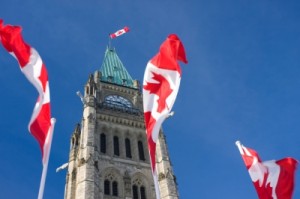Citizenship and Immigration Canada (CIC) Rebrands as Immigration, Refugees and Citizenship Canada (IRCC)
 The Canadian federal government department that used to be called Citizenship and Immigration Canada (CIC) has been renamed Immigration, Refugees and Citizenship Canada (IRCC). Usage of the new name began soon after the new government of Canada took office in November, 2015, but has become more apparent over the opening weeks of 2016.
The Canadian federal government department that used to be called Citizenship and Immigration Canada (CIC) has been renamed Immigration, Refugees and Citizenship Canada (IRCC). Usage of the new name began soon after the new government of Canada took office in November, 2015, but has become more apparent over the opening weeks of 2016.
IRCC facilitates the arrival of immigrants to Canada, provides protection to refugees, and offers programs to help newcomers settle in Canada. IRCC’s mandate also extends to granting citizenship, issuing travel documents (such as passports) to Canadians, and promoting multiculturalism.
While the acronym ‘CIC’ continues to be used in some cases, particularly on older webpages and program guides, it has become increasingly apparent over the first few months of the present government’s term in office that ‘IRCC’ is preferred in most official publications and communications.
To avoid any confusion, stakeholders should note that CIC and IRCC are not two separate departments. If documents or publications refer to CIC in one instance and IRCC in another, they are actually referring to the same department. IRCC is not so much a new department, but the successor to one that has existed for many years. However, the name CIC may continue to be used for some time by some stakeholders, such as Canadian provincial and territorial governments.
The addition of the word ‘refugees’ in the official name of the government department reflects the current government’s focus on humanitarian and refugee immigration to Canada. That being said, the government has made it clear that Canada will uphold an open and welcoming immigration policy for skilled immigrants and family class programs. There is no evidence to suggest that economic immigration or family reunification is less important to this government than its predecessors; indeed, the government has pledged to increase funding allocated to IRCC to improve program delivery and processing times.
In addition, Prime Minister Justin Trudeau has issued a public mandate to the Minister overseeing IRCC, John McCallum, to increase the maximum age for dependents to 22, from 19, to allow more Canadians to bring their children to Canada. Minister McCallum has also been asked to look into giving additional points under the Entry Express immigration selection system to provide more opportunities for applicants who have Canadian siblings.
Immigration
The ‘Immigration’ portion of the department title refers to Canada’s efforts to build and maintain a policy of welcoming newcomers in a way that is beneficial to Canadians and newcomers alike. Canada has traditionally been a country with a progressive, open immigration policy, with most Canadians being able to trace foreign ancestry within just a few generations. As Canada faces a demographic challenge and wishes to have strong economic growth and security, immigration is likely to continue to play an important role in Canada’s future.
To learn more about immigration to Canada, click here.
Refugees
The word ‘Refugees’ is the one and only word that has been added to the department’s new name. Instability and conflict over recent years in some regions of the world has led to an increase in the number of refugees globally. These individuals and families have been forced from their homes and are often in extremely vulnerable situations. The United Nations High Commissioner for Refugees (UNHCR) estimates that there are 60 million such persons in the world.
The current government of Canada has responded to this reality not only by making a semantic change to a government department, but also through concrete action. A huge effort has been made to expedite the arrival of refugees from Syria, with the government now on target to meet its commitment to settle 25,000 Syrian refugees by the end of February.
To learn more about refugees and Canada, click here.
Citizenship
One of the defining characteristics of Canada’s immigration policy is that it provides a pathway to Canadian citizenship for individuals who make the major life decision to immigrate to Canada. Becoming a Canadian citizen and joining the Canadian family is very often a humbling and emotional benchmark in an immigrant’s life.
Citizenship remains an important component of IRCC, as it was before the department was renamed.
To learn more about eligibility requirements for Canadian citizenship, as well as the rights and responsibilities that citizenship confers on an individual, click here.
CICNews will retain its current name
The Canada Immigration Newsletter, published exclusively on CICNews.com on a bi-monthly basis, will continue to be published on CICNews.com for the time being.
To find out if you are eligible for any of over 60 Canadian immigration programs operated by IRCC, please fill out a free online assessment today.
© 2016 CICNews All Rights Reserved
- Do you need Canadian immigration assistance? Contact the Contact Cohen Immigration Law firm by completing our form
- Send us your feedback or your non-legal assistance questions by emailing us at media@canadavisa.com



